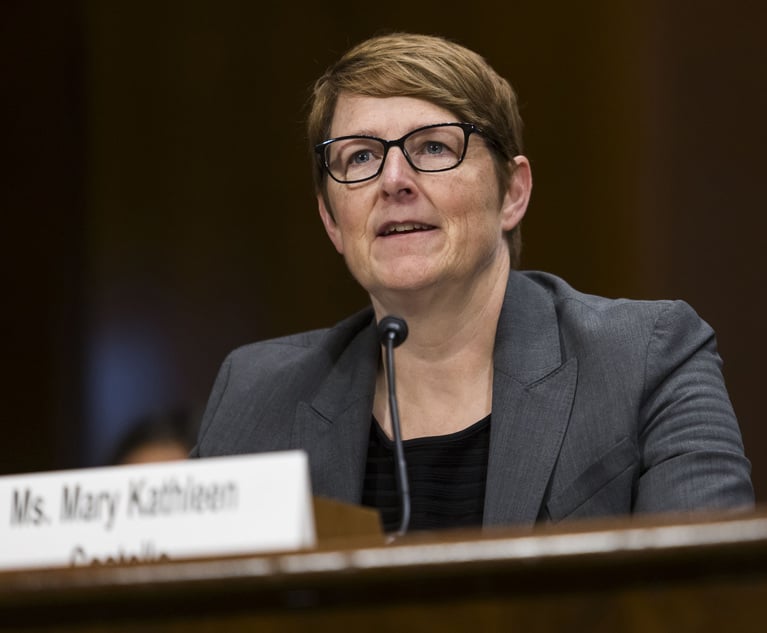 Federal Judge Renee Marie Bumb in Camden.
Federal Judge Renee Marie Bumb in Camden.Camden Federal Judge Scraps $3.5 Million Employment Verdict Following Late-Emerging Defense
The judge found after a four-day trial that defamation claims were barred by a one-year statute of limitations.
July 11, 2019 at 03:00 PM
6 minute read
The original version of this story was published on New Jersey Law Journal
A federal judge in Camden, New Jersey, has tossed a $3.5 million jury verdict in an employment dispute after ruling the plaintiff's claim for defamation by her employer was barred by a one-year statute of limitations.
The finding that the claim was time-barred comes after four years of litigation and a four-day trial. U.S. District Judge Renee Bumb of the District of New Jersey admitted it was “odd” the statute of limitations issue came before her so late in the case, which was pending in state court for more than two years before its removal to federal court.
Jurors in federal court decided in March that defendant ASRC Federal Mission Solutions of Moorestown, New Jersey, made defamatory statements about plaintiff Anna Baran to a federal agency. On Tuesday, Bumb granted a defense motion for judgment as a matter of law after finding the defamation claim was time-barred. “As odd as it seems,” the judge wrote, she did not learn of the statute of limitations dispute between the parties until the middle of the four-day trial.
While the case was in state court, plaintiff's counsel “mistated the law” on the statute of limitations to a state Superior Court judge, and that judge made an “erroneous and incorrect” ruling on the issue, Bumb said.
Baran was fired for allegedly threatening to shoot three of her supervisors. Her employer fired her and reported the alleged threats to the Joint Personnel Adjudication System, a Department of Defense database focusing on employees with security clearances. The company also reported Baran's alleged threats to local police, and she was arrested and charged with making terroristic threats. But the charges were eventually dropped.
Baran sued her former employer in January 2015 in Burlington County Superior Court, filing her complaint pro se. She said a job offer was rescinded because of the company's report to the JPAS database prevented her from getting a security clearance.
The state court dismissed her suit without prejudice in April 2015. In November 2015 her current attorney, LaTonya Bland-Tull of Hagerty & Bland-Tull in Collingswood, New Jersey, filed an amended complaint raising claims for defamation, hostile work environment and retaliatory discharge.
The state judge dismissed all but the retaliatory discharge claim. Then, in September 2017, Bland-Tull argued for the first time that her defamation claims should be reinstated because they were premised on her former employer's statements in the JPAS report. Since those statements were made in 2013, Bumb said, they would be time-barred under New Jersey's one-year statute of limitations for defamation.
However, Bland-Tull argued that the claims should proceed under the discovery rule because Baran did not learn of the JPAS report until August 2014. Lawyers for the defendant argued that the discovery rule did not apply, but Judge John Harrington of the Burlington County Superior Court reinstated the defamation claim, holding that the statute of limitations was tolled by the rule, Bumb said.
After Harrington reinstated Baran's defamation claim, ASRC Federal removed the case to federal court Sept. 25, 2017, based on the federal officer removal statute. The company argued that removal was timely because it had just learned that the JPAS report was central to the planitiff's defamation claims.
When the case went to trial before Bumb, from March 4 to 7, ASRC Federal moved for judgment as a matter of law, arguing that the jury should not hear the defamation claims because they were barred by the statute of limitations. Bumb reserved judgment on the motion and allowed the jury to consider the defamation claim. In post-verdict briefing, Bland-Tull argued that the “law of the case” doctrine binds Bumb to Harrington's decision that the discovery rule applied to the defamation claim. Bland-Tull also claimed that ASRC Federal waived the statute of limitations defense by failing to assert it earlier.
But Bumb said the plaintiff's argument “fails before this Court and should have failed before the Superior Court.” The Third Circuit has explicitly stated that, under New Jersey law, the discovery rule cannot extend the limitations period for defamation claims, she said.
ASRC Federal completed its report to JPAS on May 1, 2013, so the plaintiff would have to assert her claims no later than May 1, 2014, Bumb said. But she did not raise it until she filed her pro se complaint in January 2015.
The judge also rejected the plaintiff's claim that Harrington's ruling should apply because it has become the “law of the case.” She said a court has the power to revisit prior decisions of its own or a coordinate court under various circumstances, including cases where a prior ruling “might lead to an unjust result.” Since application of the discovery rule to a defamation is clearly erroneous, “to permit the verdict to stand under the law of the case doctrine would result in 'manifest injustice.”
The judge also rejected Bland-Tull's claim that ASRC Federal waived the statute of limitations defense. The defendant “would have been prudent” to raise the issue before trial, but she is reluctant to fault him for failing to do so because Harrington previously ruled that the issue was to be tried before a jury, Bumb said.
“In this court's final analysis, it would be perverse to allow plaintiff to benefit from her own misstatements of the law that caused this legal debacle in the first place. The law could not be clearer: there is no discovery rule exception for defamation claims. The party who was prejudiced was defendant who was forced to litigate a time-barred claim for two additional years,” Bumb said.
Bland-Tull did not respond to a request for comment. William Leahy of Littler Mendelson in Philadelphia, representing ASRC Federal, referred a call to an ASRC Federal spokesman, who declined to comment.
This content has been archived. It is available through our partners, LexisNexis® and Bloomberg Law.
To view this content, please continue to their sites.
Not a Lexis Subscriber?
Subscribe Now
Not a Bloomberg Law Subscriber?
Subscribe Now
NOT FOR REPRINT
© 2024 ALM Global, LLC, All Rights Reserved. Request academic re-use from www.copyright.com. All other uses, submit a request to [email protected]. For more information visit Asset & Logo Licensing.
You Might Like
View All
Biden's Nominee Secures U.S. Senate Confirmation for Phila. Federal Judgeship
3 minute read


How Defense Attorneys Can Prepare for the Possibility of a Nuclear Verdict
6 minute readTrending Stories
- 1Decision of the Day: School District's Probe Was a 'Sham'; Title IX Administrator Showed Sex-Based Bias
- 2US Magistrate Judge Embry Kidd Confirmed to 11th Circuit
- 3Shaq Signs $11 Million Settlement to Resolve Astrals Investor Claims
- 4McCormick Consolidates Two Tesla Chancery Cases
- 5Amazon, SpaceX Press Constitutional Challenges to NLRB at 5th Circuit
Who Got The Work
Michael G. Bongiorno, Andrew Scott Dulberg and Elizabeth E. Driscoll from Wilmer Cutler Pickering Hale and Dorr have stepped in to represent Symbotic Inc., an A.I.-enabled technology platform that focuses on increasing supply chain efficiency, and other defendants in a pending shareholder derivative lawsuit. The case, filed Oct. 2 in Massachusetts District Court by the Brown Law Firm on behalf of Stephen Austen, accuses certain officers and directors of misleading investors in regard to Symbotic's potential for margin growth by failing to disclose that the company was not equipped to timely deploy its systems or manage expenses through project delays. The case, assigned to U.S. District Judge Nathaniel M. Gorton, is 1:24-cv-12522, Austen v. Cohen et al.
Who Got The Work
Edmund Polubinski and Marie Killmond of Davis Polk & Wardwell have entered appearances for data platform software development company MongoDB and other defendants in a pending shareholder derivative lawsuit. The action, filed Oct. 7 in New York Southern District Court by the Brown Law Firm, accuses the company's directors and/or officers of falsely expressing confidence in the company’s restructuring of its sales incentive plan and downplaying the severity of decreases in its upfront commitments. The case is 1:24-cv-07594, Roy v. Ittycheria et al.
Who Got The Work
Amy O. Bruchs and Kurt F. Ellison of Michael Best & Friedrich have entered appearances for Epic Systems Corp. in a pending employment discrimination lawsuit. The suit was filed Sept. 7 in Wisconsin Western District Court by Levine Eisberner LLC and Siri & Glimstad on behalf of a project manager who claims that he was wrongfully terminated after applying for a religious exemption to the defendant's COVID-19 vaccine mandate. The case, assigned to U.S. Magistrate Judge Anita Marie Boor, is 3:24-cv-00630, Secker, Nathan v. Epic Systems Corporation.
Who Got The Work
David X. Sullivan, Thomas J. Finn and Gregory A. Hall from McCarter & English have entered appearances for Sunrun Installation Services in a pending civil rights lawsuit. The complaint was filed Sept. 4 in Connecticut District Court by attorney Robert M. Berke on behalf of former employee George Edward Steins, who was arrested and charged with employing an unregistered home improvement salesperson. The complaint alleges that had Sunrun informed the Connecticut Department of Consumer Protection that the plaintiff's employment had ended in 2017 and that he no longer held Sunrun's home improvement contractor license, he would not have been hit with charges, which were dismissed in May 2024. The case, assigned to U.S. District Judge Jeffrey A. Meyer, is 3:24-cv-01423, Steins v. Sunrun, Inc. et al.
Who Got The Work
Greenberg Traurig shareholder Joshua L. Raskin has entered an appearance for boohoo.com UK Ltd. in a pending patent infringement lawsuit. The suit, filed Sept. 3 in Texas Eastern District Court by Rozier Hardt McDonough on behalf of Alto Dynamics, asserts five patents related to an online shopping platform. The case, assigned to U.S. District Judge Rodney Gilstrap, is 2:24-cv-00719, Alto Dynamics, LLC v. boohoo.com UK Limited.
Featured Firms
Law Offices of Gary Martin Hays & Associates, P.C.
(470) 294-1674
Law Offices of Mark E. Salomone
(857) 444-6468
Smith & Hassler
(713) 739-1250





